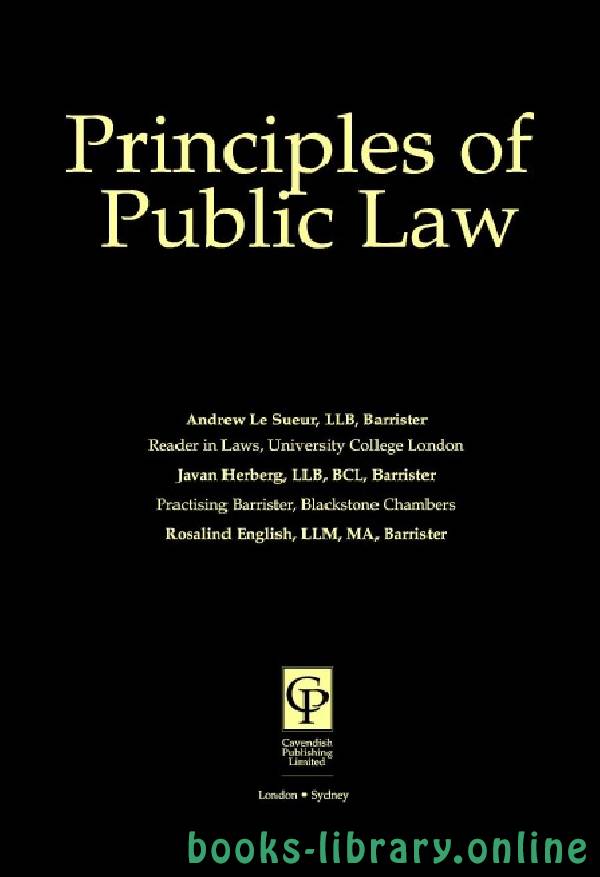📘 ❞ Principles of Public Law chapter 2 ❝ كتاب ــ أندرو لو سوور وجافان هيربيرج وروزاليند إنجلش اصدار 1999
كتب القانون باللغة الأنجليزية English Law Books - 📖 كتاب ❞ Principles of Public Law chapter 2 ❝ ــ أندرو لو سوور وجافان هيربيرج وروزاليند إنجلش 📖
█ _ أندرو لو سوور وجافان هيربيرج وروزاليند إنجلش 1999 حصريا كتاب ❞ Principles of Public Law chapter 2 ❝ عن جميع الحقوق محفوظة للمؤلف 2025 2: Book Description Part A In Chapters 1 to 5, we examine what ‘principles’ motivate people in their attempts change the way are governed (or keep it same) It is the ideals liberal democracy which today provide basis for most discussion about constitution or should be For us, modern democracy has three main features: (a) respect people’s autonomy from State authorities; (b) participation collective decision making, primarily by electing representatives at regular multi party elections; and (c) responsibility welfare and security We when why these characteristics emerged, day politicians have say about them contribution legal textbook writers made our understanding Part B In UK, no strong sense ‘the State’ Instead, a conglomeration institutions officeholders carry out tasks of government 6 8 look just some them, focusing on UK Parliament (and its diminishing importance as place robust debate about how organise ourselves), European Union increasing powers continuing ‘democratic deficit’) administrative bodies such central government departments, executive agencies local authorities C Part C (Chapters 9 18) looks processes resolving disputes between authorities people, between authorities themselves Since 1960s, a range grievance redressing institutions, colloquially known ‘ombudsmen’, been established investigate and make recommendations instances maladministration alleged have caused injustice (Chapter 10) The focus this part book is, however, role courts Over past decade, judicial review of administrative action has assumed greater significance constitutional system – not only practical method can seek challenge the legality action, but also set judge developed شرح الكتاب : الجزء أ في الفصول من إلى 5 ندرس ما تحفز "المبادئ" الناس فيه تحاول تغيير الطريقة التي نحكم بها (أو الإبقاء عليها كما هي) انها مُثُل الديمقراطية الليبرالية توفر اليوم الأساس لمعظم المناقشات حول ماهية الدستور أو ينبغي أن يكون بالنسبة لنا الحديثة له ثلاث ميزات رئيسية: (أ) احترام استقلالية سلطات الدولة ؛ (ب) مشاركة صنع القرار الجماعي طريق الانتخاب المقام الأول الممثلين الانتخابات العادية متعددة الأحزاب ؛ و (ج) مسؤولية توفير رفاه وأمنهم ندرس متى ولماذا ظهرت هذه الخصائص هو العصر الحديث يجب السياسيين يقولوا عنها وعن مساهمة القانوني لقد جعل لفهمنا لهم الجزء ب في المملكة المتحدة ليس لدينا إحساس قوي بـ "الدولة" بدلاً ذلك ملف تكتل المؤسسات وأصحاب المناصب الذين يقومون بمهام حكومة تنظر بعض منها فقط مع التركيز المتحدة البرلمان (وأهميته المتناقصة كمكان لنقاش قوي حول كيفية تنظيم أنفسنا) حول الاتحاد الأوروبي (وتزايده السلطات واستمرار "العجز الديمقراطي") والهيئات الإدارية مثل الدوائر الحكومية المركزية والوكالات التنفيذية والمحلية السلطات ج ينظر الجزء ج (الفصول عمليات حل النزاعات بين والشعب وبين الدولة أنفسهم منذ الستينيات مجموعة مؤسسات معالجة المظالم المعروف بالعامية باسم "محققو الشكاوى" تم إنشاؤه للتحقيق و تقديم توصيات حالات سوء الإدارة المزعوم وجودها تسبب الظلم (الفصل الرئيسي لهذا ومع دور المحاكم مدى العقد الماضي والمراجعة القضائية اكتسبت الإجراءات الإدارية أهمية أكبر الدستور النظام كطريقة عملية يمكن للناس خلالها السعي للتحدي شرعية عمل الحكومة ولكن أيضًا تطور القضاة كتب القانون باللغة الأنجليزية English Books مجاناً PDF اونلاين This section contains comprehensive varied law books language, where systems differ countries, with an analysis their differences comparative In states civil law, legislative other body codifies unifies common systems, judges issue binding case through although sometimes may overturned Supreme Court Historically, religious affected secular matters still used societies Sharia based Islamic principles is basic system many including Iran Saudi Arabia The scope divided into two areas concerns society, constitutional, administrative, organizational, criminal Private addresses disputes involving individuals organizations such contracts, property, damages misdemeanors commercial distinction stronger especially those that separate system courts; contrary, gap private less clear states يحتوي هذا القسم علي شاملة ومتنوعة الانجليزية حيث تختلف النظم القانونية بين البلدان تحليل اختلافاتها المقارن ولايات المدني تقوم هيئة تشريعية مركزية أخرى بتدوين وتوحيده أنظمة العام يصدر السوابق القضائية الملزمة خلال الرغم أنه الأحيان قد يتم إسقاط قانون قبل محكمة عليا تاريخيا أثر الديني الأمور العلمانية ولا يزال يستخدم المجتمعات الدينية الشريعة القائمة المبادئ الإسلامية كنظام قانوني أساسي العديد بما إيران والمملكة العربية السعودية يمكن تقسيم نطاق مجالين يتعلق بالحكومة والمجتمع الدستوري والإداري والتنظيمي والجنائي يتناول الخاص المنازعات تنطوي الأفراد المنظمات مجالات مثل العقود والممتلكات والأضرار الجنح والقانون التجاري التمييز أقوى بلدان وخاصة تلك لديها نظام منفصل ؛على النقيض فإن الفجوة والخاص أقل وضوحًا
- مساهمة من: احمد الراوي
( السبت 29 فبراير 2020 ( 4:35 مساءً )) - تبليغ عن سوء استخدام


Book Description
Part A
In Chapters 1 to 5, we examine what ‘principles’ motivate people in their
attempts to change the way we are governed (or keep it the same). It is the
ideals of liberal democracy which today provide the basis for most discussion
about what the constitution is or should be. For us, modern liberal democracy
has three main features:
(a) respect for people’s autonomy from State authorities;
(b) people’s participation in collective decision making, primarily by electing
representatives at regular multi-party elections; and
(c) the responsibility of the State to provide for people’s welfare and security.
We examine when and why these characteristics emerged, what modern day
politicians have to say about them and what contribution legal textbook
writers have made to our understanding of them.
Part B
In the UK, we have no strong sense of ‘the State’. Instead, we have a
conglomeration of institutions and officeholders which carry out the tasks of
government. Chapters 6 to 8 look at just some of them, focusing on the UK
Parliament (and its diminishing importance as the place for robust debate
about how we organise ourselves), on the European Union (and its increasing
powers and continuing ‘democratic deficit’) and on administrative bodies
such as central government departments, executive agencies and local
authorities.
Part C
Part C (Chapters 9 to 18) looks at some of the processes for resolving disputes
between State authorities and people, and between State authorities
themselves. Since the 1960s, a range grievance redressing institutions,
colloquially known as ‘ombudsmen’, have been established to investigate and
make recommendations about instances of maladministration alleged to have
caused injustice (Chapter 10). The main focus of this part of the book is,
however, on the role of courts. Over the past decade, judicial review of
administrative action has assumed a greater significance in the constitutional
system – not only as a practical method by which people can seek to challenge
the legality of government action, but also as a set of judge developed
شرح الكتاب :
الجزء أ
في الفصول من 1 إلى 5 ، ندرس ما تحفز "المبادئ" الناس فيه
تحاول تغيير الطريقة التي نحكم بها (أو الإبقاء عليها كما هي). انها
مُثُل الديمقراطية الليبرالية التي توفر اليوم الأساس لمعظم المناقشات
حول ماهية الدستور أو ما ينبغي أن يكون. بالنسبة لنا ، الديمقراطية الليبرالية الحديثة
له ثلاث ميزات رئيسية:
(أ) احترام استقلالية الناس عن سلطات الدولة ؛
(ب) مشاركة الناس في صنع القرار الجماعي ، عن طريق الانتخاب في المقام الأول
الممثلين في الانتخابات العادية متعددة الأحزاب ؛ و
(ج) مسؤولية الدولة في توفير رفاه الناس وأمنهم.
ندرس متى ولماذا ظهرت هذه الخصائص ، ما هو العصر الحديث
يجب على السياسيين أن يقولوا عنها وعن مساهمة الكتاب القانوني
لقد جعل الكتاب لفهمنا لهم.
الجزء ب
في المملكة المتحدة ، ليس لدينا إحساس قوي بـ "الدولة". بدلاً من ذلك ، لدينا ملف
تكتل المؤسسات وأصحاب المناصب الذين يقومون بمهام
حكومة. تنظر الفصول من 6 إلى 8 في بعض منها فقط ، مع التركيز على المملكة المتحدة
البرلمان (وأهميته المتناقصة كمكان لنقاش قوي
حول كيفية تنظيم أنفسنا) ، حول الاتحاد الأوروبي (وتزايده
السلطات واستمرار "العجز الديمقراطي") والهيئات الإدارية
مثل الدوائر الحكومية المركزية والوكالات التنفيذية والمحلية
السلطات.
الجزء ج
ينظر الجزء ج (الفصول من 9 إلى 18) في بعض عمليات حل النزاعات
بين سلطات الدولة والشعب ، وبين سلطات الدولة
أنفسهم. منذ الستينيات ، مجموعة مؤسسات معالجة المظالم ،
المعروف بالعامية باسم "محققو الشكاوى" ، تم إنشاؤه للتحقيق و
تقديم توصيات حول حالات سوء الإدارة المزعوم وجودها
تسبب في الظلم (الفصل 10). التركيز الرئيسي لهذا الجزء من الكتاب هو ،
ومع ذلك ، حول دور المحاكم. على مدى العقد الماضي ، والمراجعة القضائية
اكتسبت الإجراءات الإدارية أهمية أكبر في الدستور
النظام - ليس فقط كطريقة عملية يمكن للناس من خلالها السعي للتحدي
شرعية عمل الحكومة ، ولكن أيضًا مع تطور مجموعة من القضاة
#2K
0 مشاهدة هذا اليوم#62K
8 مشاهدة هذا الشهر#97K
1K إجمالي المشاهدات- 🎁 كن أول كاتب اقتباس في هذه الصفحة واحصل على هديّة 15 من النقاط فوراً 🎁

